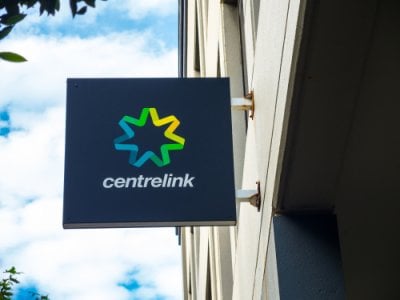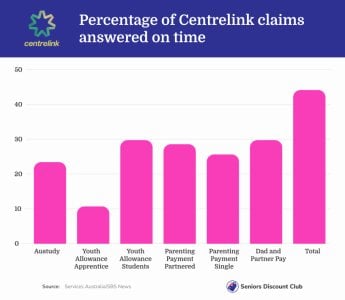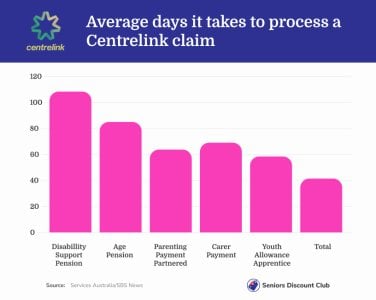Discover which Centrelink payments are prone to frustrating delays—is yours on the list?
Navigating the world of Centrelink payments can often feel like a challenge, especially for those who have come to rely on these services.
The promise of timely financial support is crucial, yet recent data suggest that Centrelink's efficiency is far from ideal.
For the first four months of 2024, it was reported that only 43 per cent of Centrelink claims were processed on time.
The 'agreed timeliness standard' that Centrelink aspires to meet remains somewhat mysterious, as Services Australia has not fully clarified what this standard entails.
However, the figures speak volumes, revealing a system struggling under the weight of demand.

For instance, Youth Allowance Apprentice claims are at the bottom of the punctuality pile, with a mere 10 per cent processed on time.
This is a concerning statistic for young apprentices who are often at the start of their careers and in need of timely financial support.
Austudy and Youth Allowance Student claims fare slightly better, but with only 23 and 29 per cent processed on time respectively, there's a clear indication that students are also facing frustrating delays.
For parents, the picture is equally disheartening. Parenting Payment Single claims have a 25 per cent on-time processing rate, while Parenting Payment Partnered and Dad and Partner Pay claims hover around the 28 to 29 per cent mark.

Services Australia Chief Executive David Hazlehurst has acknowledged the backlog and the department's efforts to address it.
He stated: ‘As I said in February, our first priority has been to clear the Agency's claims on hand—the backlog.’
‘At that time, I outlined that Social Security and Health claims on-hand went on to peak at 1.35 million in February.’
‘With the onboarding, training and now contribution, of more than 5,000 staff, we have been able to cut the backlog by more than half,’ Mr Hazlehurst added.
The backlog, as of 1 May, consisted of 1,522,706 claims, with nearly half languishing for over 120 days. Half of these claims—741,938—had been processed for over 120 days.
Disability Support Pension claims are particularly slow, averaging 107 days to process.

Age Pension and Carer Payment claims are also caught in the quagmire, taking 84 and 58 days on average, respectively.
The average processing time for all Centrelink claims was 41 days.
The strain on the system is further highlighted by the increased call wait times for Centrelink.
With over 33 million calls handled in the year to 31 March 2024, an increase from the previous year, the average wait time has ballooned to nearly 32 minutes.
This represents a significant increase from the previous year's 21-minute average, which is crucial for individuals awaiting their payments.
Despite these challenges, Mr Hazlehurst remains cautiously optimistic, stating, 'We have turned the corner, but we’re far from declaring victory.'
A 2023 report from the Auditor-General casts further doubt on the robustness of the methodology used to measure welfare claim processing timeliness.
It read: ‘The Department of Social Services and Services Australia’s processes for monitoring, reporting and continuously improving payment timeliness are partly effective.’
‘The methodology for measuring welfare claim processing timeliness is not robust.’

We'd love to hear from you in the comments below. Have you experienced delays with your Centrelink payments? How have you managed the waiting period? Share your experiences in the comments below!
The promise of timely financial support is crucial, yet recent data suggest that Centrelink's efficiency is far from ideal.
For the first four months of 2024, it was reported that only 43 per cent of Centrelink claims were processed on time.
The 'agreed timeliness standard' that Centrelink aspires to meet remains somewhat mysterious, as Services Australia has not fully clarified what this standard entails.
However, the figures speak volumes, revealing a system struggling under the weight of demand.

Only 43 per cent of Centrelink claims were processed on time in the first four months of 2024. Image source: Shutterstock
For instance, Youth Allowance Apprentice claims are at the bottom of the punctuality pile, with a mere 10 per cent processed on time.
This is a concerning statistic for young apprentices who are often at the start of their careers and in need of timely financial support.
Austudy and Youth Allowance Student claims fare slightly better, but with only 23 and 29 per cent processed on time respectively, there's a clear indication that students are also facing frustrating delays.
For parents, the picture is equally disheartening. Parenting Payment Single claims have a 25 per cent on-time processing rate, while Parenting Payment Partnered and Dad and Partner Pay claims hover around the 28 to 29 per cent mark.

Services Australia Chief Executive David Hazlehurst has acknowledged the backlog and the department's efforts to address it.
He stated: ‘As I said in February, our first priority has been to clear the Agency's claims on hand—the backlog.’
‘At that time, I outlined that Social Security and Health claims on-hand went on to peak at 1.35 million in February.’
‘With the onboarding, training and now contribution, of more than 5,000 staff, we have been able to cut the backlog by more than half,’ Mr Hazlehurst added.
The backlog, as of 1 May, consisted of 1,522,706 claims, with nearly half languishing for over 120 days. Half of these claims—741,938—had been processed for over 120 days.
Disability Support Pension claims are particularly slow, averaging 107 days to process.

Age Pension and Carer Payment claims are also caught in the quagmire, taking 84 and 58 days on average, respectively.
The average processing time for all Centrelink claims was 41 days.
The strain on the system is further highlighted by the increased call wait times for Centrelink.
With over 33 million calls handled in the year to 31 March 2024, an increase from the previous year, the average wait time has ballooned to nearly 32 minutes.
This represents a significant increase from the previous year's 21-minute average, which is crucial for individuals awaiting their payments.
Despite these challenges, Mr Hazlehurst remains cautiously optimistic, stating, 'We have turned the corner, but we’re far from declaring victory.'
A 2023 report from the Auditor-General casts further doubt on the robustness of the methodology used to measure welfare claim processing timeliness.
It read: ‘The Department of Social Services and Services Australia’s processes for monitoring, reporting and continuously improving payment timeliness are partly effective.’
‘The methodology for measuring welfare claim processing timeliness is not robust.’
Key Takeaways
- Centrelink payment times are under scrutiny, with only 43 per cent of claims processed on time in the first four months of the year, according to Services Australia.
- Youth Allowance Apprentice claims had the lowest on-time processing rate at just 10 per cent.
- Services Australia has acknowledged the backlog in claims and has hired over 5,000 new staff members to help address the issue.
- The 2023 report from the Auditor-General indicates that while there has been some improvement, the methodology for measuring welfare claim processing timeliness is not robust, leaving room for further improvements in monitoring and reporting.







